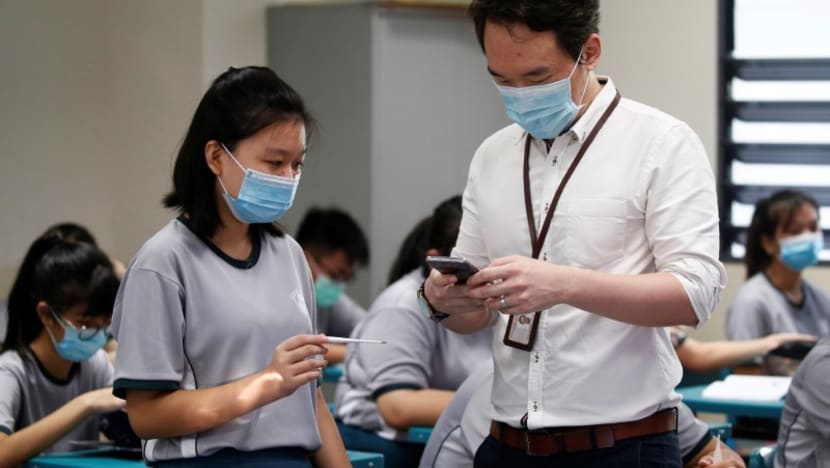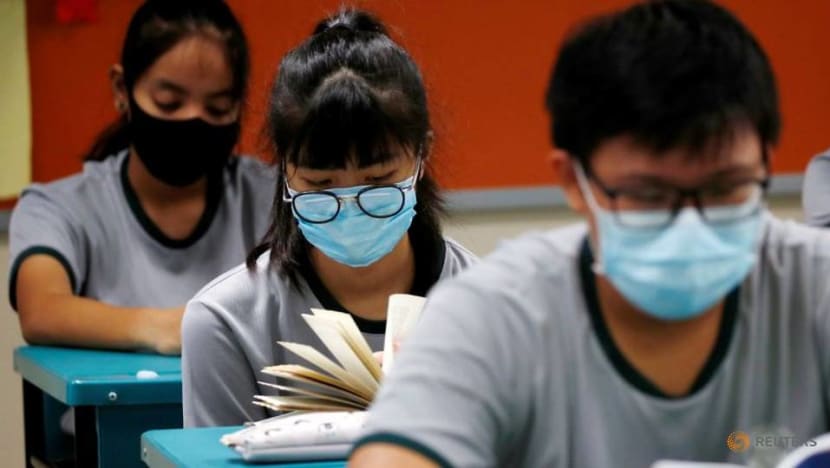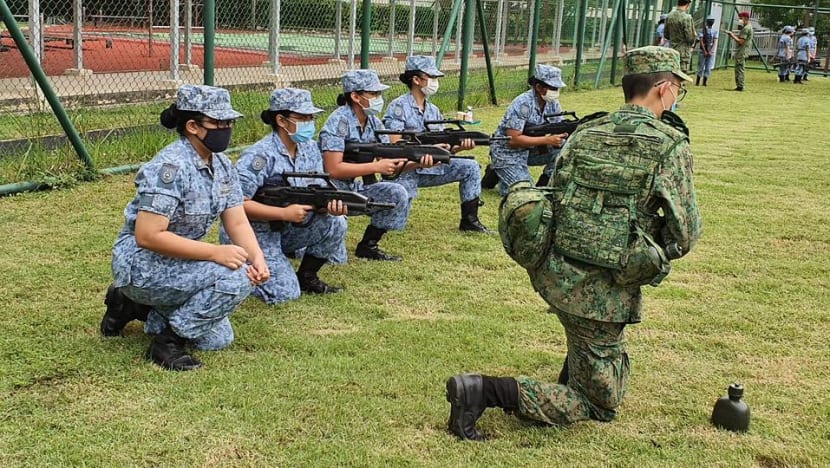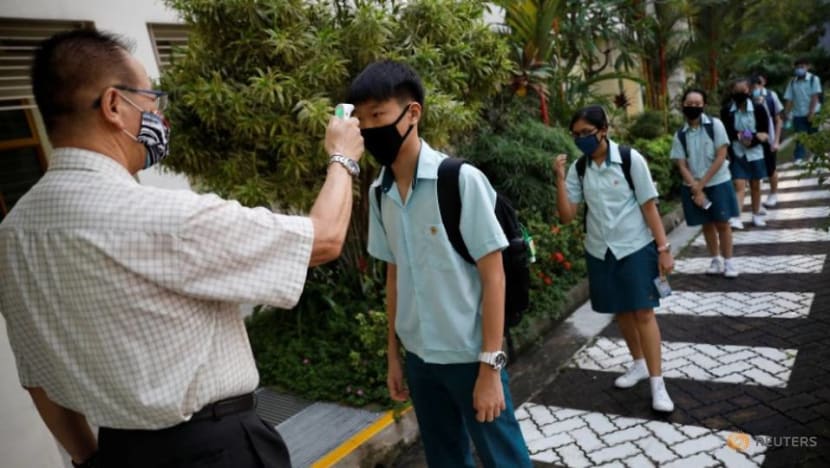commentary Commentary
Commentary: Teachers have 12 weeks of holiday each year – fact or myth?
With packed semester schedules, school holidays are the only real time teachers get to step back to prepare for the next term, undergo training and focus on co-curricular activities, says Jason Tan.

Students have their temperature checked in class at Yio Chu Kang Secondary School, as schools reopen amid the coronavirus disease (COVID-19) outbreak in Singapore on Jun 2, 2020. (Photo: REUTERS/Edgar Su)
SINGAPORE: The March holidays have just concluded.
As an educator, one thing I do hear during the school holidays is this: “Teachers are so fortunate. They get 12 weeks off work each year. What a great deal!”
This all-too-common perception of teachers has persisted in the face of mounting evidence to the contrary.
On the face of it, it is all too easy to believe teachers enjoy among the most generous paid leave schemes. After all, since students are off from school during the holiday periods, teachers are getting a break, right?
Not entirely.
READ: Commentary: After the craziest year, teachers start first day of school with nervous apprehension
PROTECTED DOWNTIME AND FLEXIBILITY
In practice, teachers may be called upon for duty at any time during the school holidays. In fact, concerns that teachers are not getting enough of a break even during such periods were raised in Parliament in August 2016.
The Ministry of Education’s reply referred to guidelines that include the idea of protected holiday time to help teachers manage workloads and enjoy sufficient rest and bond with their families.
This time comprises at least two days in March, two weeks in June, two days in September and three weeks during the year-end break.
READ: Commentary: Teachers now have new jobs. Schools will never be normal again after COVID-19
At the same time, the Ministry allows individual schools flexibility with teacher deployment during school holidays in order to meet their specific needs.
For instance, it is common practice for schools to conduct remedial or enrichment classes for specific groups of students. In some schools, teachers may offer small group remediation for students in order to address learning gaps identified during lessons and tests.
CHALLENGING DEMANDS SINCE PANDEMIC HIT
Teachers have experienced more challenging demands since the coronavirus hit our shores. During the mid-year school break in May 2020, then Education Minister Ong Ye Kung announced that schools would be inviting students in the graduating cohorts to return for coaching and consultations with their teachers.

Ong mentioned that this support was customary for graduating students during the mid-year break, but had taken on added urgency because of the anxiety brought about by school closures earlier in the year.
Furthermore, some students taking subjects with coursework or practical components – in the sciences, design and technology, and food and consumer education for example - needed to use school facilities and equipment in order to make up for lost time.
READ: Commentary: Your PE teacher’s secret headaches during a year of COVID-19
HIGH TEMPO OF CO-CURRICULAR ACTIVITIES
Besides academic lessons, some teachers are busy during school holiday periods with co-curricular activities. Some activities like camps or leadership courses are less easily conducted during term time when there is a high tempo of teaching and formal curriculum.
Holiday periods in fact provide students preparing for competitions a chance to step up training under the guidance of teachers and external coaches. For instance, the resumption of the National School Games this year after a brief hiatus in 2020 meant that sports teams can make use of the March or June breaks for more intensive training.

Pre-coronavirus, school holidays were also a prime time for schools to organise overseas learning experiences.
These trips, which centred around such matters as cultural exchanges, adventure learning or service learning, provided students a chance to develop key Character and Citizenship Education skills and competencies such as leadership. Quite naturally, some teachers would find their school breaks occupied with these trips.
PREPARING FOR THE NEXT TERM, TACKLING NEW CHALLENGES
Another form of work that occupies some teachers during school breaks is lesson preparation.
Amid a dynamic environment in which schools continue to introduce a variety of teaching methodologies such as differentiated instruction, many teachers need that brief let-up from the relentless press of the school day.
READ: ‘Definitely a loss' when students miss out on in-person CCAs, but COVID-19 could bring opportunities: Experts
The school holidays are an invaluable time to step back to refresh their lesson plans and teaching techniques to better meet their students’ diverse learning needs.
In addition to all of the points that have already been mentioned, school breaks are sometimes used for teacher professional development activities.
For instance, schools may organise whole-school strategic planning meetings in order to chart key directions for the future. Teachers may also meet colleagues teaching the same cohort or the same subject.
READ: Commentary: Teachers love their jobs and feel valued but face immense challenges
There, they discuss topics and fresh challenges facing teachers, in a bid to figure out how to deal with changing social mores and challenges wrought by an increasingly digital, fast paced world - including cyberbullying, mental health or efforts to foster a student peer support culture.
12 WEEKS OF HOLIDAYS – IT’S JUST A MYTH
It should be clear by now that the myth of teachers enjoying the luxury of 12 weeks of paid holidays is nothing more than fiction.
The reality of teachers’ lives is that attending to their students’ developmental needs, whether academic or non-academic, often takes precedence for at least part of the school holiday periods over spending time on their families or leisure activities.
Their own professional development needs are also often addressed during school breaks, on top of the workshops or meetings that they normally attend during term time.

You might ask, why the Ministry of Education cannot mandate that school holidays be left completely free of school activities in order for both teachers and students to enjoy more restful breaks.
The fact appears to be that the 40 weeks of school within each calendar year are insufficient for schools to fully carry out the myriad of tasks and programmes with which they have been entrusted. We see this for instance in the case of overseas learning experiences, preparation for inter-school competitions and extra academic lessons.
The Ministry has to maintain a balance between maximising rest time for teachers and students during school holidays and addressing the learning and developmental needs of both.
SIGN UP: For CNA’s Commentary weekly newsletter to explore issues beyond the headlines
School leaders have an important responsibility too in terms of ensuring that their teachers have sufficient downtime during school holidays in order to recharge themselves for the challenges of the next school term.
It is also important to remember that in lieu of annual holiday leave, school teachers are eligible for full-pay leave for up to 10 working days in a calendar year to attend to urgent private affairs such as marriage, the selection of an HDB flat or serious illness of family members, or up to 12 days if examination leave is included.
Thus, for most teachers the school holidays represent the only opportunity for a brief respite from the frenetic pace of school life.
Listen to three working adults reveal how their PSLE results have shaped their life journeys in a no-holds barred conversation on CNA's Heart of the Matter podcast:
Jason Tan is an associate professor at the National Institute of Education.














